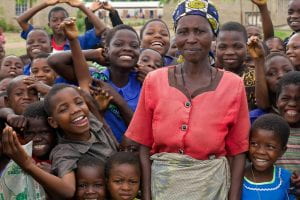The shades of menopause In Yaoundé —by Patrick Awondo
By p.awondo, on 24 May 2019
Among the remaining taboos of Cameroonian society are some gender and sexuality issues. Menopause is one of them. You hardly find anything in public discourse on this issue. There is no forum dedicated to menopause nor research groups or reports.
Social science researchers, especially anthropologists, have tried to understand menopause in Cameroon. Their view on the issue is binary and culturalist. Apart from Mbarga’s work comparing menopause in Cameroon and Switzerland[1], most of the studies are anachronistic and globally fail on giving a clear understanding of this issue in the contemporary context.
Research by the French anthropologist Jeanne-Francoise Vincent[2] on Beti women in the central region of Cameroon in the 1970s suggests that menopause signifies the end of sexual submission for women in this patriarchal society. The beti culture constructs menopause as the beginning of a period of “initiative and development”. Thus, menopause marks “the beginning of a new period in which women can also exercise their power and their ability to become equal to men” (2003 131). This transformation of the status of the person must be accepted by the husband. ” The arrival of menopause is for women therefore a way to lead their own life.
This change is evident in language which names “the menopausal woman in a rewarding way and designates her as” an important woman, an accomplished woman “nya mininga” (2003 134)). Being menopausal is, according to Vincent, a condition for positions of power, such as becoming a woman leader in the secret societies of the village. This role makes the woman who endorses her an eminent person with strong responsibilities and real power.
On the symbolic side described by ethnologists, menopause implies, on the one hand, a lifting of multiple prohibitions, for example acts and words in public spaces, and, on the other hand, an opening of possibilities among others, access to certain foods, acquiring new roles in the community such as therapist, midwife, leader of rituals etc. These symbolic benefits are still often reported in rural areas, but are not so visible in the city, where a heterogeneous population coexists with great cultural diversity.
In everyday life, however, the women interviewed in Yaoundé point out different experiences for which the reported facts do not overlap with the realities described by some anthropologists. One explanation is obviously the gap between the traditional and rural spaces in which some research has been conducted and the city where traditional values are diluted in more a globalized, westernized and at the same time individualistic environment.
There remains the experience that is often individual in the face of menopause. The women we interviewed had 3 types of interlocutors that illustrate urban social reconfigurations. The first interlocutor for educated women is their gynaecologist. He is the first to answer questions about physiological changes and disruptions. For all that, women point out that they get mixed and unsatisfactory answers. As some research points out, the current discourse on menopause is highly medicalised and ambivalent.
A second type of interlocutor is constituted by friends or professional networks. Finally a third source of information is the internet for those who have access to it. However, knowledge of the menopause and its symptoms remains very low among women interviewed in Yaoundé. This seems to be the case in the rest of Africa. An Ivorian study conducted on 278 women in 2017[3] showed that the symptoms and risks of menopause are unknown by 73.68% of women. However, a test carried out for this purpose shows that the level of knowledge of menopause is related of the level of schooling. This also seems true in Yaoundé where educated women seem to have a better knowledge of menopause in general and are able to search on google for medical information.
Another important point is the use of medicinal plants to treat or prevent symptoms. A majority of women interviewed in Yaoundé used plants purchased from herbalists and other traditional healers. They are either in the form of a concentrated liquid, in powder or simply as fresh or dried barks. Depending on the quality and intensity of the symptoms, some women go to the hospital to see a general practitioner. These women are often discouraged by healthcare professionals who explain that menopause can not be truly treated.
It is known that modern medicine offers menopausal hormone treatments (HRT) to cope with discomfort with the advantage of eliminating many symptoms, the risk of cardiovascular disease and osteoporotic fractures. However, concerns regarding possible harmful side effects of HRT has impacted on its uptake by women. Hormone Replacement Therapy is not accessible and available in many African countries, particularly Cameroon.
Today, women are turning more and more to other medicines and plants. This poses a problem in the context where the marketing of medicinal plants remains poorly controlled, despite the willingness of public health services to better regulate the practice of traditional medicine through recognition of the function and quasi-union organization created for these actors.
Reference
[1]Josiane Mbarga, « Regards de Suissesses et de Camerounaises citadines sur la ménopause : dépasser les dichotomies binaires », Anthropologie & Santé [En ligne], 8 | 2014, mis en ligne le 31 mai 2014, consulté le 21 mai 2019. URL : http://journals.openedition.org/anthropologiesante/1396
[2] VINCENT J.-F., 1976. Traditions et transition : Entretiens avec les femmes beti du Sud-Cameroun. Paris, ORSTOM Berger-Levrault ; VINCENT J.-F., 2003. « La ménopause, chemin de la liberté selon les femmes beti du Sud-Cameroun », Journal des africanistes, 73(2) : 121-136.
[3] See Kouamé A, Koffi Y., Piba S., et al, 2018, « Niveau de connaissance de la ménopause et habitudes alimentaires et médicinales des femmes en Côte-D’Ivoire », European Scientific Journal, Vol 14 Ju 2018,
 Close
Close






